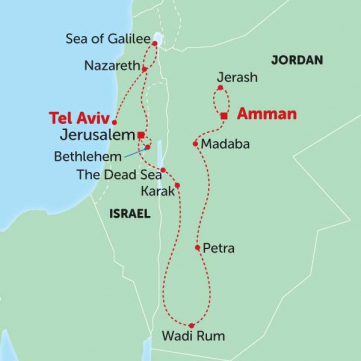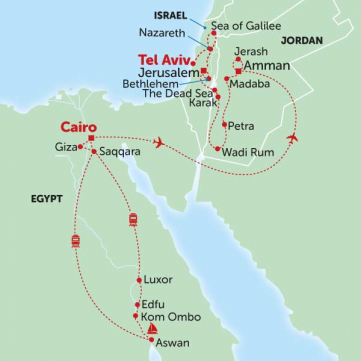Book NOW for $1 £1 €1 • Flexible Payments • No Change Fees • Private Departures Available
- Home >>
- Israel Travel Advice
Israel Travel Advice
Getting to Israel
Israel ‘the land of milk and honey’, is an incredible country in the Middle-East, considered a sacred land by many religions. The country borders Egypt, Gaza Strip, Jordan, West Bank, Syria and Lebanon. Israel also borders the Mediterranean Sea and the Gulf of Aqaba.
- London to Jerusalem will take around 5 hours
- Los Angeles to Jerusalem takes around 14 hours
- New York to Jerusalem will take around 10.5 hours
- Cape Town to Jerusalem takes around 12 hours
- Sydney to Jerusalem will take around 22 hours
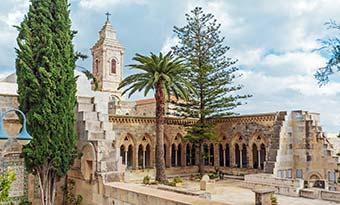
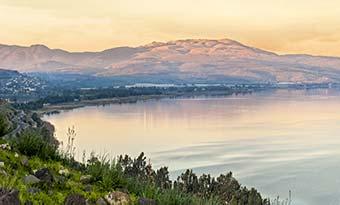
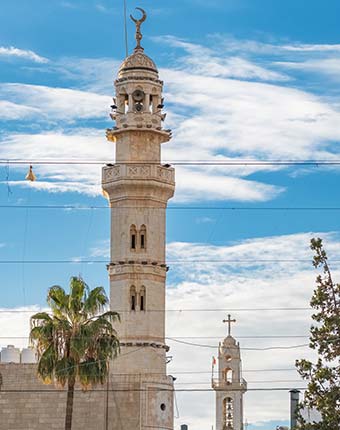
Main airport
in Israel
The main international airport in Israel is Ben Gurion Airport (TLV), located in Lod which is about 20 kms from Tel Aviv. The airport is commonly known by its Hebrew name Natbag.
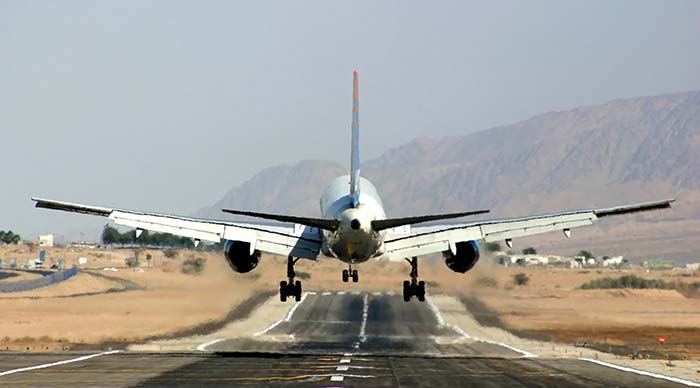
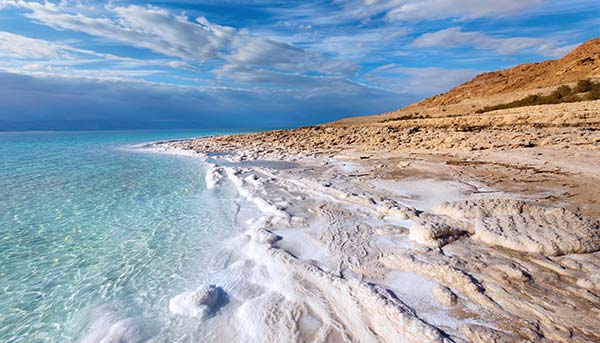
Geography &
landscape of Israel
Israel is split into four geographical regions - Mediterranean coastal plains, central hills, the Jordan Rift Valley and the Negev Desert. Being such a small country, everything is within easy reach in Israel. Mountains, fertile plains, beaches and deserts are often only minutes apart. If you were to drive east to west, it would only take around 90 minutes.
Culture, religion
and etiquette
Israel is referred to by many as ‘the holy land’, considered sacred to a variety of religions. The Jewish religion is the most predominant in Israel with 74% of the population identifying as Jewish. 18% are Muslim, 2% Christian and 1.6% Druze.
Present day Israel has two distinct nationalities - the Palestinian and the Jewish. Each nationality has their own ancient history and religious roots in the country. Relationships between the Palastinians and the Jews are extremely taboo for both sides. The heat between the two is largely due to their very complicated and troubled past, each believing that Israel is rightfully theirs.
In both Palastinian and Jewish societies, marriages were traditionally arranged. This is much less common today, but it does still happen. It is against the law for a Jew to marry a non-Jewish person in Israel, and should a Jewish divorce occur, the man has the right to stop their ex-wives remarrying.
Most family units are based on the nuclear family model, with the addition of grandparents also living in the home. Families tend to spend their time separately, with the children spending most of their days with others their age and not with their parents.
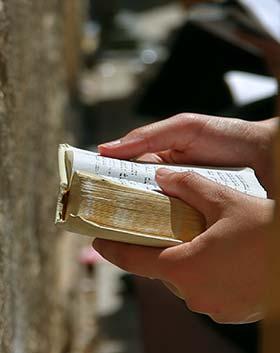
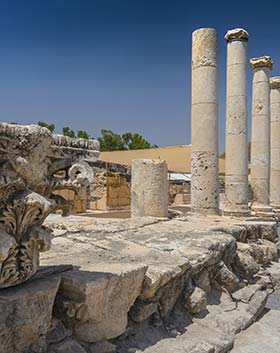
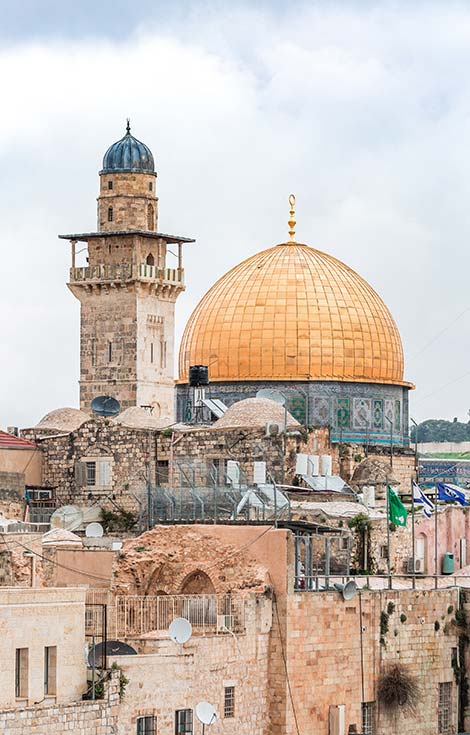
Languages spoken in Israel
The official language of Israel is Hebrew, however the majority of the Arab community predominantly speak Arabic. You will often hear other languages spoken such as Italian, Spanish and Russian. Both Hebrew and Arabic schools require students to speak English as a second language, so most people in Israel will have some level of English.
Capital city in Israel
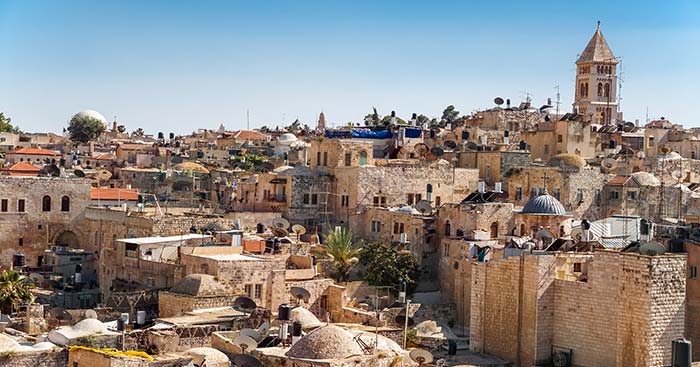
Jerusalem
The capital city of Israel is Jerusalem. The city is steeped in history and is considered to be one of the holiest places for many religions. Jerusalem was built on a plateau in the Judaean Mountains, in the centre of the country between the Mediterranean and the Dead Sea.
Top tip!
When visiting places of worship, keep shoulders and arms covered and wear shorts/skirts below the knee.
Visas for Israel
Most people travelling to Israel do not need a visa if the trip is under 90 days. When you reach the Ben Gurion airport you will usually be handed an entry card instead of a stamp on your passport - keep this with your passport until you leave the country.
The countries who do not need a visa if the visit is less than 90 days are: Albania, Andorra, Austria, Belarus, Belgium, Bulgaria, Croatia, Cyprus, Czech Republic, Denmark, Estonia, Finland, France, Georgia, Germany, Greece, Hungary, Iceland, Ireland, Italy, Latvia, Liechtenstein, Lithuania, Luxemburg, Macedonia, Malta, Man and Canal Islands, Moldova (biometric only), Monaco, Montenegro, Netherlands, Norway, Poland, Portugal, Romania, Russian Federation, San Marino, Serbia, Slovakia, Slovenia, Spain, Sweden, Switzerland, Ukraine, United Kingdom, Botswana, Central African Republic, Lesotho, Malawi, Mauritius, South Africa, Swaziland, Vanuatu, Australia, Cook Islands, Fiji Islands, Hong Kong, Japan, Korea (South), Macau, Micronesia, Mongolia, Nauru, New Zealand, Niue, Palau, Papua New Guinea, Philippines, Singapore, Solomon Islands, Taiwan, Tonga, Canada, United States, Argentina, Bahamas, Barbados, Belize, Brazil, Chile, Colombia, Costa Rica, Dominica, Dominican Republic, Ecuador, El Salvador, Grenada, Guatemala, Haiti, Honduras, Jamaica, Mexico, Panama, Paraguay, Peru, St. Kitts & Nevis, St. Lucia, St. Vincent and the Grenadines, Surinam, Trinidad & Tobago and Uruguay.
Any countries not mentioned above will need to obtain a visa to visit Israel.
ATMs & Money in Israel
Withdrawing cash in Israel shouldn’t be a problem, especially within the cities. ATMs are very common, especially at airports and transportation hubs. If you are heading really off the beaten track, you should be able to find one in the nearest town.
In large towns and cities you will usually be able to pay with a debit or credit card for most things. However, if you are heading to small local diners or markets, they may only accept cash.
Travel health & vaccinations for Israel
This information should only be used as a guide and you should always consult your local GP for advice on travel vaccinations.
The CDC and the WHO advice for the following routine vaccinations to be up to date when visiting Israel: Measles, Mumps, Rubella (MMR), Tetanus, Diphtheria & Pertussis (TDAP), Chickenpox, Shingles, Pneumonia, Influenza, Meningitis and Polio. They also recommend the following travel vaccinations to be completed: Hepatitis A, Hepatitis B, Typhoid and Rabies.
Is it safe to drink tap water in Israel?
Tap water is completely safe to drink in Israel - everywhere apart from near The Dead Sea. However due to the amount of minerals it contains, it can make you feel sick if you consume a lot. It’s best to stick to bottled water for the majority of the time.
Electricity and plugs in Israel
The sockets and plugs in Israel are of type C and H. Israel is the only country which uses an H plug which has two flat pins in a V shape with a grounding pin. The same plug will also fit a C type socket which has round pins. The standard voltage is 230 V with a frequency of 50 Hz.
Emergency calls
We always advise our passengers to have a few key phone numbers saved in case of emergencies. The main emergency numbers in Israel are:
- 100 is the number for the police service
- 101 is the number for the ambulance service
- 102 is the number for the fire service
Travelling as a single woman in Israel
On the whole, it is safe to visit Israel as a solo female traveller. The public transport system is easy to use and the country is used to seeing women travelling alone.
Due to a lot of bad press in the media, many people have a notion that Israel is a dangerous place to travel. However, most people's experiences leave them feeling safe and welcome. Unlike other Middle Eastern countries, women are seen as equals in Israel. They are respected, independent and empowered, and also have to serve in the army, alongside men.
Although there is still animosity and attacks between the Palestinians and the Jews, it is generally safe for tourists in most parts of Israel. Of course, there is always a risk of petty theft in heavily touristic areas. Use your common sense wherever you are.
Wifi and internet access
Internet access should not be a problem in most parts of Israel. Most restaurants, shopping centers, guest houses and hotels will have free wifi to connect to.
Time zone
Jerusalem, Israel
Israel (IST or GMT+3) is 2 hours ahead of London (GMT), 10 hours ahead of Los Angeles, and 7 hours ahead of New York. Israel runs on Israel Standard Time and switches to Israel Summer Time, advancing their clocks by one hour. Visit timeanddate.com to calculate the time difference from your current location.
Getting around Israel
Car Hire
Renting a car is a great way to travel between places, explore the hill regions or drive through the desert areas, but it is not recommended for driving around the cities - especially in Tel Aviv and Jerusalem. Parking is scarce, roads are busy and there are lots of one way streets so it’s difficult to navigate on your own.
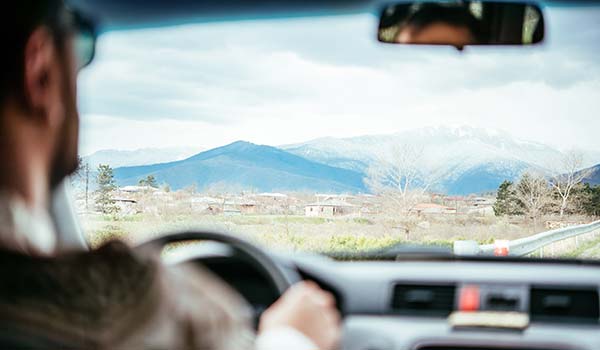
Train
Trains are one of the most popular modes of transport in Israel and are a great way to get out of the Ben Gurion Airport and into the cities. The only downside is that trains do not travel to Jerusalem. They are relatively new, clean, modern and regular.
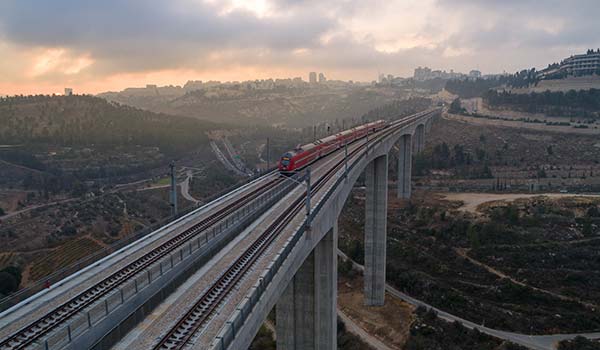
Bus
Buses are also one of the best ways to travel in Israel. The bus service has an extensive network and you can generally get anywhere via a bus. You will need to purchase a separate ticket for each leg of the journey.
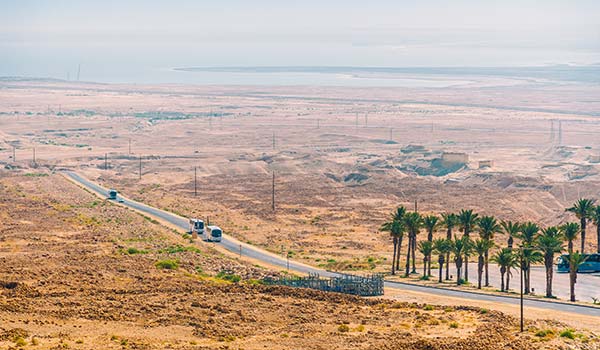
Monit Sherut
These are essentially shared taxi services which seat around ten people per van. They travel from the larger cities to the smaller towns along the way and back. As public transport is not in service during the weekends (Friday afternoons to Saturday evenings) a Monit Sherut is a great option.
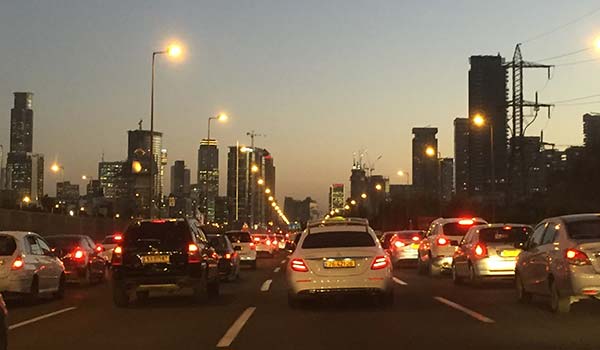
History
The history of Israel is a long and complicated one, but here’s a brief snapshot to get you started.
The first record of Jews being in Israel (then called Kanaan) was in 3000 BC. Since then, the Jews were banished over and over until the Romans conquered in 63 BC. The Jews rebelled and renamed the land Israel in 66 BC. The country was renamed Palaestina in 135 BC and became part of the East Roman Empire. In 634 Palaestina was conquered again by Islamic rulers (the Caliphate) - who ruled until until 1187. Palestinia was then ruled by Egypt until the Ottoman Empire conquered in 1517 and Israel become part of Syria.
In 1917 the United Kingdom defeated the Ottomans and Palestine was claimed by the UK. The next few decades saw Jews immigrating into Palestine which caused heated violence between the Jewish and Arab people. The UN partition plan came into play in 1947 which divided the country into Jewish and Arab states. Israel finally gained independence in 1948, but were attacked by neighbouring Arabic countries. However Israel managed to defeat more of the Palestinian side. Israel was peaceful for another 9 years until the Suez war broke out which included a long string of terrorist attacks.
In 1967 Israel started the Six Day War which ended in a ceasefire. Israel was peaceful again for a while until 1973 when Syria and Egypt attacked, but Israel pushed them back to the ceasefire lines. 1977 was the first time Israel had a government without socialist views. By 1979 a peace treaty was granted between Israel and Egypt.
In the early 1990’s Israel signed various declarations to help bring peace to the country. This included a peace treaty between Israel and Jordan and they began transferring the authority from Israel to the Palestinians. Peace once again didn’t last long as in 1995 Prime Minister Yitzhak Rabin was assassinated. After a reelection which left Ehud Barak in charge, another violent outbreak happened in 2000. For a few years terror was prevalent in the streets of Israel with attacks happening at an alarming rate. Conflict between the Israelis and the Palestinians still happen today, with regular attacks on both sides. It is however safe for tourists to visit the country. Certain areas will not be allowed to be visited by tourists and the government will not let you near those areas of conflict. However, the majority of the country is completely safe for visitors.





